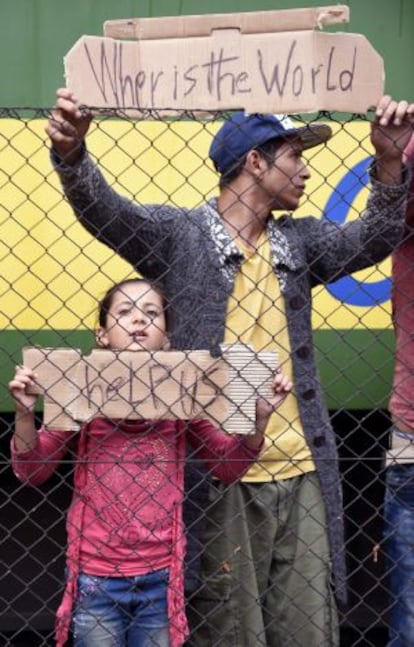Another Europe
The European Union must address the refugee crisis as an opportunity to reinforce itself

It was a long time coming, but it looks like Europe is now taking the necessary steps towards the kind of policy change that the refugee crisis requires. The European Commission is to propose taking in an extra 120,000 refugees, to be shared out among the EU¡¯s 28 member states. Together with the earlier proposal to admit 40,000 people, this would bring the total to 160,000.
Though considerable, the figure represents a fraction of all the refugees who will arrive in Europe this year. But even more relevant than the number itself is the intention to design a permanent, automatic, binding burden-sharing mechanism.
In order to address this crisis with some guarantee of success, it is necessary for member states to acknowledge the global dimension of the problem. From this vantage point, it is positive to see the Spanish government rectifying and announcing that it will accept its corresponding refugee quota.
No country can deal with this challenge alone. It is a challenge for all of Europe, not just for the arrival countries ¨C who are in that position because of their location?¨C or for countries such as Germany, which receive the highest number of asylum requests because they have been more generous than others to date.
It is inspirational to see citizens mobilizing in a spirit of solidarity in Spain and elsewhere
In August alone, Germany received 104,000 applications for asylum. Regardless of the fact that it is the European country with the biggest economy and population, it is obvious that Germany cannot, and must not, deal alone with an avalanche of refugees that could reach as many as 800,000 before the year is out.
Germany is acting as a role model in this crisis. It deserves credit for not having avoided the problem, and its moral authority on the issue is unquestionable. And it¡¯s not just about its government policy, with Angela Merkel exercising a highly necessary continental leadership; it¡¯s also about citizen commitment. Many Germans have personally offered aid to the refugees, dwarfing the xenophobic rhetoric expressed by some and countering the 336 attacks against reception centers recorded this year, most of which were carried out by neo-Nazi groups.
It is also inspirational to see citizens mobilizing in a spirit of solidarity in Spain and elsewhere. But xenophobic groups and parties are still out there, ready to take political advantage of the situation. The best antidote against this is a broad, shared, long-term European policy. There is no other option. The alternative can only be political disintegration and moving back on achievements such as the free circulation of individuals, as the continent hurtles towards a scenario of walled nationalisms and chaotic militarization of its borders.
The refugees¡¯ hopes lie in Europe. And Europe can better build itself by being generous with them
Europe must view necessity as a virtue, look at the long term and address this crisis as an opportunity to take the union forward and reinforce it. Its demographic situation is not buoyant. With a population of 507 million, Europe needs migratory contingents in the short and medium term to reinforce its own economy. The refugees who are now knocking on the door may contribute to this future, just as the Spanish Civil War exiles contributed to the future of Mexico and other countries who welcomed them in.
Many of the new arrivals are young people and families with children who know they will be unable to return to their own countries for many years to come, and will not resign themselves to giving their offspring nothing but the hopeless horizon of a refugee camp. Their hopes lie in Europe. And Europe can better build itself by being generous with them.
Translation by Susana Urra
Tu suscripci¨®n se est¨¢ usando en otro dispositivo
?Quieres a?adir otro usuario a tu suscripci¨®n?
Si contin¨²as leyendo en este dispositivo, no se podr¨¢ leer en el otro.
FlechaTu suscripci¨®n se est¨¢ usando en otro dispositivo y solo puedes acceder a EL PA?S desde un dispositivo a la vez.
Si quieres compartir tu cuenta, cambia tu suscripci¨®n a la modalidad Premium, as¨ª podr¨¢s a?adir otro usuario. Cada uno acceder¨¢ con su propia cuenta de email, lo que os permitir¨¢ personalizar vuestra experiencia en EL PA?S.
?Tienes una suscripci¨®n de empresa? Accede aqu¨ª para contratar m¨¢s cuentas.
En el caso de no saber qui¨¦n est¨¢ usando tu cuenta, te recomendamos cambiar tu contrase?a aqu¨ª.
Si decides continuar compartiendo tu cuenta, este mensaje se mostrar¨¢ en tu dispositivo y en el de la otra persona que est¨¢ usando tu cuenta de forma indefinida, afectando a tu experiencia de lectura. Puedes consultar aqu¨ª los t¨¦rminos y condiciones de la suscripci¨®n digital.








































